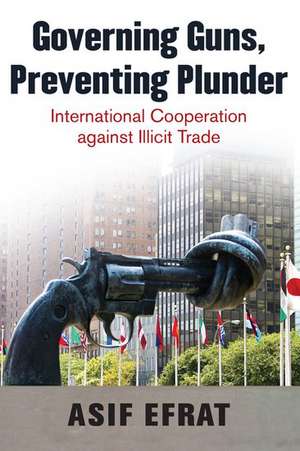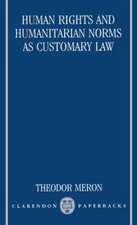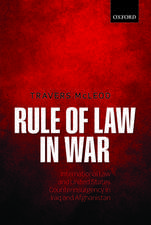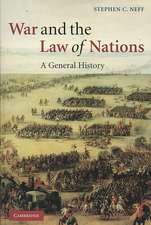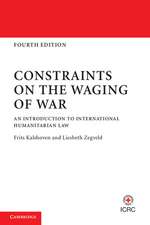Governing Guns, Preventing Plunder: International Cooperation against Illicit Trade
Autor Asif Efraten Limba Engleză Paperback – 18 sep 2014
| Toate formatele și edițiile | Preț | Express |
|---|---|---|
| Paperback (1) | 228.94 lei 31-37 zile | |
| Oxford University Press – 18 sep 2014 | 228.94 lei 31-37 zile | |
| Hardback (1) | 421.79 lei 31-37 zile | |
| Oxford University Press – 16 aug 2012 | 421.79 lei 31-37 zile |
Preț: 228.94 lei
Preț vechi: 277.05 lei
-17% Nou
Puncte Express: 343
Preț estimativ în valută:
43.81€ • 47.57$ • 36.80£
43.81€ • 47.57$ • 36.80£
Carte tipărită la comandă
Livrare economică 11-17 aprilie
Preluare comenzi: 021 569.72.76
Specificații
ISBN-13: 9780190206871
ISBN-10: 019020687X
Pagini: 380
Ilustrații: black & white illustrations
Dimensiuni: 234 x 157 x 23 mm
Greutate: 0.55 kg
Editura: Oxford University Press
Colecția OUP USA
Locul publicării:New York, United States
ISBN-10: 019020687X
Pagini: 380
Ilustrații: black & white illustrations
Dimensiuni: 234 x 157 x 23 mm
Greutate: 0.55 kg
Editura: Oxford University Press
Colecția OUP USA
Locul publicării:New York, United States
Recenzii
This book is a major accomplishment. It is rare indeed to find a volume in the social sciences that addresses the question of how international cooperation occurs in the area of banned activities and illicit goods. Asif Efrat weaves a domestic political economy account into his analysis of international collaboration to explain why some governments have embraced (and others have resisted) such bans, from efforts to control trade in small arms to criminalization of human trafficking; from illicit drugs to trade in looted antiquities. The evidentiary basis on which this work rests is monumental, including original evidence on the preferences of 118 governments on regulating illicit international trade in small arms. Compelling, engaging and rigorous, this book is one of the very best reads available on the topic of cooperation among governments to define and address international criminal activity.
It is an axiom of the literature on international institutions that a sine qua non for cooperation among states is shared interests. When it comes to illicit global trade-trafficking in drugs, arms, and people-Asif Efrat shows that notwithstanding their rhetoric, states do not in fact have a shared interest in regulation or prohibitions. Efrat's analysis is clear, compelling, and an admirable example of careful exploration of micro-foundations. He makes both a theoretical and an empirical contribution on an important subject.
Most studies of transnational crime focus on the criminals and their corrupting influence on governments. In this innovative project, Asif Efrat calls attention to the role of legal actors-namely, domestic interests within states-in posing barriers to, but sometimes making possible, international cooperation to fight illicit trade. His detailed research into illegal trafficking in small arms, human beings, and looted antiquities provides insights into the domestic challenges to international cooperation.
An engaging discussion of the complicated issues surrounding nations in addressing and regulating diverse forms of illicit trade. ... Efrat clearly outlines a theoretical framework and demonstrates how it is applicable to various forms of illicit trade, concentrating on human trafficking, arms trafficking, and the illicit trade in looted antiquities. ... The presentation of the material is comprehensive, yet the information does not overwhelm the reader as the author makes sure to define any terms that may be unfamiliar to a non-academic reader. The engaging and organized nature of the text allows the reader to easily understand and learn about the issues at hand, allowing for all audiences including those outside of academia – to absorb and appreciate its content.
Asif Efrat's book offers a rigorous assessment of the most-unresolved puzzles surrounding the illicit trade of goods and people. Even though the book addresses complex questions, it is written in a clear prose and straightforward style. It is a must-read and an essential guide for scholars and policymakers working on illegal trade, an area in which secrecy and clandestine workings greatly complicate analysis.
It is an axiom of the literature on international institutions that a sine qua non for cooperation among states is shared interests. When it comes to illicit global trade-trafficking in drugs, arms, and people-Asif Efrat shows that notwithstanding their rhetoric, states do not in fact have a shared interest in regulation or prohibitions. Efrat's analysis is clear, compelling, and an admirable example of careful exploration of micro-foundations. He makes both a theoretical and an empirical contribution on an important subject.
Most studies of transnational crime focus on the criminals and their corrupting influence on governments. In this innovative project, Asif Efrat calls attention to the role of legal actors-namely, domestic interests within states-in posing barriers to, but sometimes making possible, international cooperation to fight illicit trade. His detailed research into illegal trafficking in small arms, human beings, and looted antiquities provides insights into the domestic challenges to international cooperation.
An engaging discussion of the complicated issues surrounding nations in addressing and regulating diverse forms of illicit trade. ... Efrat clearly outlines a theoretical framework and demonstrates how it is applicable to various forms of illicit trade, concentrating on human trafficking, arms trafficking, and the illicit trade in looted antiquities. ... The presentation of the material is comprehensive, yet the information does not overwhelm the reader as the author makes sure to define any terms that may be unfamiliar to a non-academic reader. The engaging and organized nature of the text allows the reader to easily understand and learn about the issues at hand, allowing for all audiences including those outside of academia – to absorb and appreciate its content.
Asif Efrat's book offers a rigorous assessment of the most-unresolved puzzles surrounding the illicit trade of goods and people. Even though the book addresses complex questions, it is written in a clear prose and straightforward style. It is a must-read and an essential guide for scholars and policymakers working on illegal trade, an area in which secrecy and clandestine workings greatly complicate analysis.
Notă biografică
Asif Efrat is Assistant Professor of Government at the Interdisciplinary Center (IDC) Herzliya. He received his Ph.D. in government from Harvard University and has taught at Cornell Law School.
